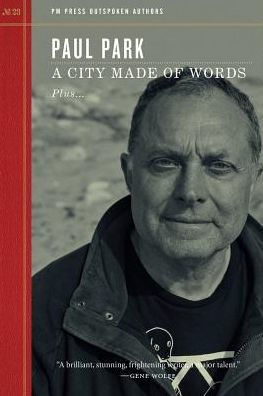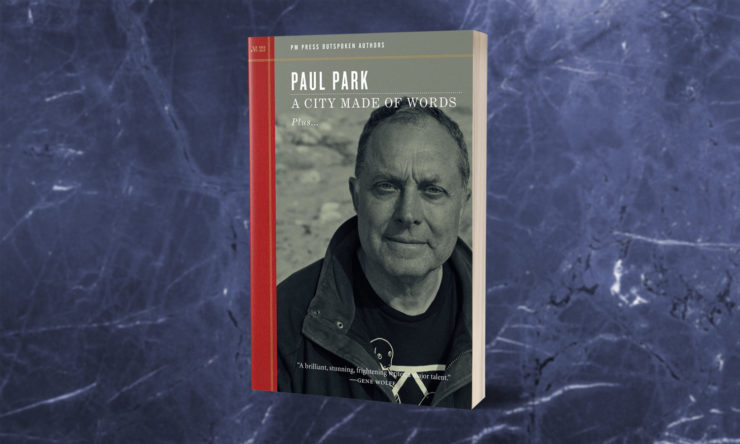Paul Park’s A City Made of Words is the latest volume in PM Press’s Outspoken Authors line of short science fiction collections. We’re now twenty-three volumes into the series, each of which combines an interview with the author, a bibliography of varying completeness, and some combination of new and reprinted writing—and until I read this new book, I thought I knew how they worked. There were, on the one hand, the collections that might serve as introductions, books like Elizabeth Hand’s Fire or John Crowley’s Totalitopia, concise proofs of the author’s value. On the other hand I counted such books as Samuel Delany’s The Atheist in the Attic and Michael Moorcock’s Modem Times 2.0 as essential reading for the committed that would challenge, mystify, or scare off neophytes.
With A City Made of Words, Park eludes my categories. I can’t decide whether this book is a perfect entry to the author’s work, or written for committed Park readers only. I suspect that the author intends this. Let me explain.
Just about five years ago, Tor published Paul Park’s All Those Vanished Engines, his first novel under his own name since the conclusion of his four-volume fantasy A Princess of Roumania six years before. All Those Vanished Engines didn’t bear much comparison to the previous few books — though the writing of those books figures into it — but longtime readers shouldn’t have been surprised to see Park take a new direction. The Roumanian books bore little comparison to Park’s prior two novels, historical fantasies about Christ and the women in his ministry, and those titles themselves were departures from the baroque, slightly Wolfean science fiction of his first few publications. All Those Vanished Engines comprised three novellas, each set in a different alternate history, and each providing dubious accounts of Park, his circumstances, or his family’s history. The futility of pinning down Paul Park’s writing had become a central theme of Paul Park’s writing.
Cities made of words have roughly the same foundations as castles built on air: Stories, and science fiction stories more than most, rely on suspension of disbelief. In proper postmodern fashion, and contrary to most science fiction practice, Park delights in undermining his cities of words, in plunging his castles to the ground. The collection begins with a tall tale called “A Short History of Science Fiction, or The Microscopic Eye.” Though the surface plot is strange and a little sad, I couldn’t conduct an innocent reading. That title sent me searching for an allegory, and I found it. “Creative Nonfiction” begins conventionally enough, but turns into what might best be described as a metafiction that writes itself, while “A Conversation with the Author” is a bleak fable about the nature of writing. The longest story in the collection, “Climate Change,” begins in a roughly naturalistic mode, drawing parallels between an aging man’s vanishing memories and our planet’s ravaged biosphere, before turning gnomic and surreal. Even the standard Outspoken Author interview with series editor Terry Bisson isn’t safe from deconstruction, as we see when Park (or, as he suggests, his stand-in) answers a question about metafiction:“Usually there is a metafictional break in the story, as, for example, here, where the reader understands they’re being toyed with. In theory, the whole tone of the interview might change, as every subsequent answer is now suspect.”
Buy the Book


A City Made of Words
If this review makes A City sound ponderous and solemn, I’ve done it a disservice. It’s a rare metafiction that isn’t playful, and even comparatively bleak stories contain snatches of levity. The academic-turned-interrogator in “A Conversation with the Author” has comically bitter memories of the indignities of twenty-first century academia (“my MFA and four years of subsequent adjunct work, sleeping in my car, selling blood, and eating at food banks”), and the professor-turned-patsy of “Creative Nonfiction” has a comic relish for self-destruction. Park is a faculty brat who grew up to teach writing, so he has a whole life’s store of observations of collegiate absurdity. Gentle and not-so-gentle digs at the academy clutter the stories, especially “A Resistance to Theory,” the collection’s best and longest. It would remain a fun story if you knew nothing about literary theory and its fads; if you know a little, it’s hilarious.
The sole nonfiction piece included is “A Homily for Good Friday,” an uncomfortable talk delivered to the congregation of St. John’s Episcopal Church in Williamstown, Massachusetts on the most ambivalent holy day on the Christian calendar. Park speaks about failure and its inevitability, of the impossibility of belief without doubt. He suggests faith arises from a failure of belief: “Maybe that’s a feature of the truth, that it cannot be believed with any certainty. If something inspires certainty, then it has to be a lie.” Perhaps this is a key to Paul Park’s later writing. Park’s fiction inspires our faith by undercutting our belief. This approach will win him few readers and fewer awards — in the Bisson interview, Park admits he’s much shortlisted but never garlanded — but it will earn him admirers. I count myself one, and hope more readers discover this remarkable writer.
A City Made of Words is available from PM Press.
Matt Keeley reads too much and watches too many movies. You can find him on Twitter at @mattkeeley.











Seems as if Mr. Park has subscribed to the Babel Fish Proof for the Non-Existence of God, to wit, if we have a proof for God (such as the existence of something so totally useful as a Babel fish), then we have no need of faith, and without faith, God is nothing. (Poof!) On a more serious note, an untested faith (that is, one free of doubt) is generally thought to be a small faith, if a faith at all. So, if Mr. Park tests us, then, perhaps, like a concerned deity, he loves us.